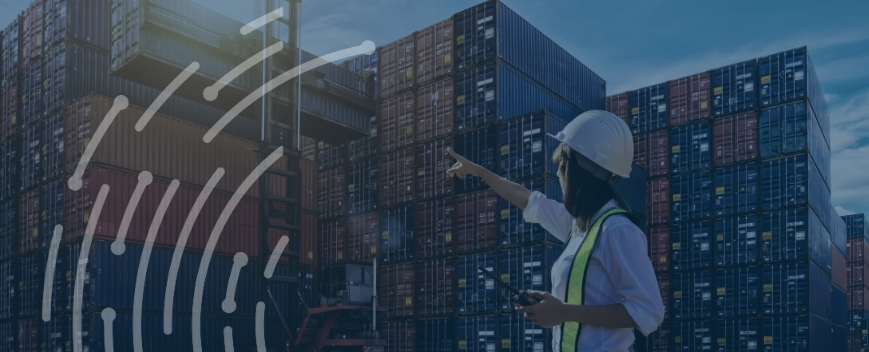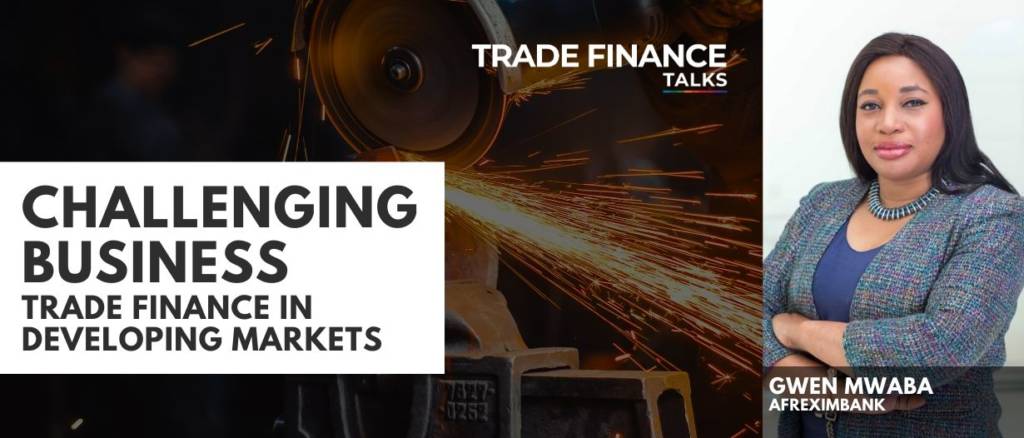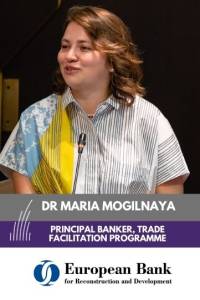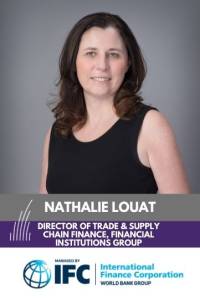DFIs & Export Finance

Content
Women in Trade 2021 – DFIs & Export Finance
Gwen Mwaba, Afreximbank

Is now an exciting time to be in trade finance? Why?
Now is definitely a very exciting time to be in trade finance. There is so much going on globally and that means more activity and more opportunities to finance trade.
If I look at what is going on in Africa for instance, the African Continental Free Trade Area (AfCFTA) coming into force will create a single market in Africa, which will aid the movement of people and goods across the continent and simulate intra African trade. This opens up so many opportunities for Trade Financiers to support clients who are taking advantage of the opportunity to enter new markets. My employer the African Export-Import Bank is launching a Pan-African Payment & Settlement System to help facilitate intra African trade. In the digital space globally, there are quite a few developments, which are all geared to support trade.
Blockchain is being used in trade, we have seen Fintechs developing digital market places which some banks have already adopted, innovation in the world of artificial intelligence which is changing the way documents are checked in the trade operations area. There’s a buzz and excitement, so why not be part of this exciting journey?
On International Women’s Day, what is the most important message you want to send out to young women thinking about their careers?
If you’re a young woman thinking about your career, I’d just like to encourage you to believe in yourself and don’t be afraid to reach for your dreams. Everything seems daunting when you are about to take a big step in your career. Feel the fear but do it anyway! Do consider some of the following practical tips:
- Find yourself a mentor. Learn from someone who has walked the path you are about to embark on.
- Bring your best self to every situation: aim to stand out from the crowd.
- Try, try, try, and try again. Don’t give up easily. There’ll always be challenges along the way but its how you overcome them, that helps you grow and build resilience.
- Don’t be content with being average. You can do extraordinary things if you don’t stand in your own way by doubting yourself.
Deborah Read Gwen’s latest article with TFG – Afreximbank: Accelerating the growth of African tradespoke to TFG recently, discussing the ‘China Plus One’ Strategy – Best of Both Worlds?

Dr Maria Mogilnaya, EBRD

What specific tasks and responsibilities does your job require?
The last 12 months have really turned our lives upside down. The pandemic and lockdowns brought new opportunities to many. The EBRD faces an unprecedented challenge to support our regions in this time of crisis, and I lead the EBRD’s crisis response in trade finance, including supporting trade in medical products. Working in solidarity with our shareholders and our clients gives me enormous satisfaction and I am proud to be working at the EBRD.
As we were learning more about remote working on a daily basis in 2020, I stepped up to become a people manager to three amazing women (all with their own unique journeys into trade finance). Being able to pass on my knowledge and support their growth every day is what I truly love about my job!
What’s the most important piece of advice you’d give to a woman thinking of starting a career in trade finance?
I believe trade finance is the most exciting area of banking and you can join from all walks of life. I have recently hired a bright young woman who is transitioning into banking after several years of working as a lawyer. I have given her the advice I lived through myself when I joined the EBRD more than ten years ago and follow to this day: be curious, do not stop learning and never give up (with the latter being my personal motto). There will be setbacks along the way, but the most curious, knowledgeable and resilient among us will always rise to the top!
We spoke to Maria recently, taking a look at the role of multilaterals and public-private partnerships, and how they can help the trade finance community achieve sustainability objectives.

Mairead Lavery, EDC

In your opinion, why is it important that more women take up trade as a career in the near future?
Let me start with a simple answer: more women in business means more growth for economies. The evidence is overwhelming. Whether they’re launching small businesses in emerging economies, or chairing multi-nationals, women are making an impact. So this isn’t just about making life better and fairer for an underrepresented segment of our society (though that is a huge!). It’s about having a tangible economic benefit.
We know that in Canada, women-owned businesses represent only 16 percent of our country’s small- and medium-sized enterprises (SMEs), with about one-in-ten of these being exporters. Studies tell us that increasing that number by just ten percent would increase our nation’s GDP by more than $150 billion dollars. Globally, if women entrepreneurs participated at equal levels to men in the economy, world-wide GDP could expand by as much as $5 trillion dollars. That is a tangible economic benefit.
I also believe that adding women to the trade equation has a multiplier effect beyond dollars, adding a diversity of voices, approaches and fresh ideas that can’t help but strengthen the global economy. International trade is an important way that nations build relationships with one another, state to state and business to business. Women strengthen those relationships.
Is now an exciting time to be in trade? Why?
The answer, of course, is yes. Trade has always been exciting, but I do think we are at a special moment in time. Two reasons come to mind.
The first is COVID-19 related. We are, in the next few months, going to be climbing out of one of the biggest global economic downturns in generations. The good news is that in most economies around the world, the responses of governments and central banks have been equal to the task, while on the corporate side I believe we’ll be coming out of this challenge smarter and more resilient. Simultaneously, we’re seeing very positive signs that trade liberalisation is on the upswing. A new U.S. administration is signalling a more predictable and collaborative approach to trade, while new free trade zones are being established – most recently in the Asia-Pacific region. These factors, combined with months of pent-up consumer demand, are a strong foundation for near-term growth.
The second reason for excitement is the emergence of a new trend toward more progressive trade. Before COVID-19, the world’s number one concern was climate change. In a post-pandemic world, that concern is as profound as ever. Governments, private investment, and large swaths of corporate leadership in a range of sectors, are all signalling their support for a transition to a more just and sustainable global economy. International trade is going to be a huge part of that transition.
Nathalie Louat, International Finance Corporation

Is now an exciting time to be in trade? Why?
Absolutely. Trade is exciting because it brings such important benefits to emerging markets. There is a direct link between trade and economic growth. Trade finance is essential to trade—some recent estimates suggest that in the wake of the Covid-19 pandemic the world could need as much as $6.5 trillion more to support imports and exports. Trade finance is in a particularly fascinating stage today. Some material market shifts which began prior to the pandemic have become even more necessary now. The advent of innovative trade finance technologies and digitization offers to make transactions more efficient and transparent. This digitization has laid the groundwork for paradigm-shifting platforms and tools that can provide increasingly intelligent models and financial solutions. The pandemic has expedited the actualization of these shifts.
It has also put more pressure on the supply of trade finance, especially in emerging markets. It is important that all participants in the trade ecosystem work together to realize this collective opportunity for transformation.
What’s the most important piece of advice you’d give to a woman thinking of starting a career in trade finance?
Master the asset class. Understand its impact on the economy. Assess the risks. Early in your career, it is absolutely critical to understand comprehensively what drives both the value and operational execution of trade finance. Trade Finance is a specialized field, and portfolios of trade finance transactions are originated differently, and they behave differently. The more you understand about why each transaction is needed, how it is executed, how they work together in a balanced portfolio, and how risks are distributed, the more effective you will be. Your management will see value in not just what you do on a daily basis, but how much you understand about the implications of your actions and choices. This is particularly true in specialized financial fields, and trade finance is a highly specialized field.
Susan Starnes, International Finance Corporation

Why did you choose a career in this sector?
I joined IFC because I wanted to apply finance, economics and strategy to help emerging markets. The trade finance asset class hooked me with a vibrance rising from portfolios of relatively short tenors and small tickets, among other factors. Sometimes, I watch real time marine tracking maps and think about the containers that IFC has financed on those carriers. Trillions of dollars in trade finance moves across the globe every day – it is directly attached to cargos on ships, planes, and trucks. Every dollar is attached to a good that crosses a border, bringing with it income growth, economic development, knowledge, critical supplies. Trade finance data represents the people, businesses, countries and visionary initiatives that it finances. Communities all over the world are teeming with activity made possible by trade as goods exchange hands. Thus, trade finance is an important mechanism by which people, companies and countries function and thrive.
On International Women’s Day, what is the most important message you want to send out to young women thinking about their careers?
The most important principle to apply every moment is Integrity. Integrity is essential to every decision you make – what you say, what you do and how you treat others. Period. Always. Beyond obvious reasons, I have found that consistent, continuous integrity provides the strongest foundation for confidence. It is also important to know that you have individual responsibility for the quality of your work, but you cannot succeed alone. From intern to CEO, you work with a team. Whether that team is three people or 30,000, find your own unique way to provide lift. High performing teams require members that actively and consciously contribute to team dynamics. I am certain that you want to be a part of a high performing team. It is an exciting place to be.
Caroline Freund, World Bank

Is now an exciting time to be in trade? Why?
Recent years have been almost too exciting in trade! Trade has been a centrepiece of US-China tensions that originated before the COVID crisis. Global supply chain disruptions loomed large in the early months of the crisis, but trade has proven remarkably resilient, recovering to pre-crisis levels and enabling essential food and medical supplies to reach where they are needed.
Going forward, reinvigorating trade growth will be critical for a stronger recovery from the current economic crisis. Women also have unique opportunities to benefit from new trends in global trade, including the rise in services, global value chains, and the digital economy. But there are many challenges that need to be addressed to ensure that trade can support peace and prosperity, as it has done throughout the post-war period.
We need new ideas on how to the address existing threats to the trade system, such as subsidies and state-owned enterprises. We need to better police the growing prevalence of export controls, especially on essential goods, and to explore appropriate policies in nascent areas like data and e-commerce. Finally, trade coupled with carbon taxes can support greener growth by ensuring that goods are produced where they use resources most efficiently.
On International Women’s Day, what is the most important message you want to send out to young women thinking about their careers?
Choose a career in an area that you are passionate about, one where you can envision a rewarding career path five years down the road. Work is stimulating, fulfilling, and fun when you are focused on a central goal and your contributions matter. It will not always be easy. There will be hurdles that seem insurmountable, times when you will need to leave your comfort zone, and others when you will struggle to complete mundane tasks. Maintain a sense of humour when things go awry and celebrate when they go better than expected. Always prioritise, keeping your focus on the objectives that matter most to you.
Hoda Moustafa MIGA, World Bank

How do we attract more women into careers within an industry, that has traditionally been dominated by men?
Mentoring is important, I enjoy connecting with young professionals in the industry and tend to make closer connections with other women. This goes beyond the professional and I have fortunately been able to develop real friendships within my career.
I also think that COVID has gone a long way in demonstrating to managers that work can be accomplished anywhere and anytime, and flexible working has always been a major priority for women.
Many women face additional challenges because of school children at home where they are viewed as the primary caregiver. Hopefully as schools re-open women can take advantage of permanent flexwork options to ensure advancement notwithstanding challenges to extensive travel and “face-time.”
On International Women’s Day, what is the most important message you want to send out to young women thinking about their careers?
Don’t be afraid to think big! Women have a major role in this industry which will only grow over time. Make meaningful connections with other women, find the appropriate blend of work and life, and accentuate your skills. It can be overwhelming at times, but never give up!
Sponsors & Partners
Learn MoreMore about Women in Trade
- WITTP Over The Years
- Topics
- Podcasts
- Videos



























